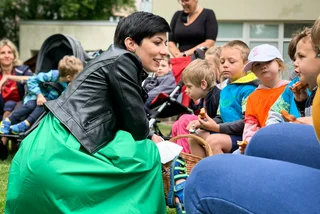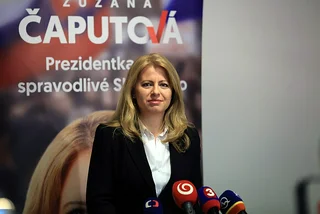The Czech Presidency may be a largely constitutional role, but as the recent health problems of current President Miloš Zeman have shown, it is far from merely ceremonial. The President plays an important part in directing Czech foreign policy, reviewing and advising the actions of legislators, and dealing with the appointment of new governments following elections.
President Zeman’s tenure will expire on March 8, 2023, although chronic health problems and a long recent stint in intensive care have led to calls for his powers to be removed even sooner.
Seven people have so far announced their candidacy to be the next President. Other names are the subject of intense speculation; and hopes are growing that in 2023, the Czech Republic could see its first serious opportunity to elect a female head of state.
Underrepresented in Czech Politics
Women have suffered severe historical underrepresentation in Czech politics. There has never been a female President or Prime Minister, and current TOP 09 leader Markéta Pekarová Adamová is only the second ever leader of a Czech parliamentary party.
Yet there is cause for optimism. The general election held on October 8-9 saw the highest ever proportion of female MPs elected, with 50 out of the 200 seats in parliament now filled by women. This was an increase on the 44 women elected in the previous election in 2017.
Yet this 25% proportion of female MP still lags far behind the proportions seen in countries such as Germany and the UK, where women now make up more than a third of MPs. And the share of women is even more woeful in the proposed cabinet of incoming Prime Minister Petr Fiala: it’s expected that only 3 of his 18 cabinet ministers will be female.
In this context, the potential for a woman to take over the Presidency may seem unlikely; but if it does happen, it could bring about a fundamental shift towards greater gender equality in Czech politics. Two women have already announced their candidacy, while the participation of a third is hotly anticipated.
Who's in the running?
Denisa Rohanová
Head of the Czech Association of Debtors, Denisa Rohanová has a long history of defending people facing difficult life circumstances. In order to secure her candidacy, which requires signatures from at least 50,000 members of the public, Rohanová will likely rely on the support of members of her association as well as the large number of debtors in the Czech Republic, who will see in her a figure dedicated to representing their interests.
Rohanová’s other policy priorities beyond help for debtors remain somewhat unclear. She refuses to align with any existing political party, having made a brief foray into local politics with Tomio Okamura’s Dawn of Direct Democracy party (a predecessor of his current Freedom and Direct Democracy outfit). In one of the more bizarre political miscalculations of recent times, Rohanová chose to announce her candidacy on April Fools’ Day, 2021.

Klára Long Slámová
Lawyer and former politician Klára Long Slámová announced her candidacy in May 2021. Her website and campaign materials produced so far make much of her potential to be the Czech Republic’s first “prezidentka.” Currently aged 44, her election as President would mark a significant shift from the procession of elderly white men who have so far held the role.
Slámová briefly served as an MP with the Civic Democrats in 2010, before leaving ODS as a result of differences of opinion on party policies. She has already presented her goals for a potential Presidency, including an emphasis on dialogue to resolve political differences, greater international cooperation with EU and non-EU countries, and bolstering the Czech Republic’s domestic security against cyber attacks and other foreign threats. Long Slámová's non-Czech double-barreled surname is the result of her marriage to an American man.

Danuše Nerudová
Mendel University chief Danuše Nerudová has not yet announced her Presidential bid, but her candidacy is the most hotly anticipated of any of the three women under discussion. Nerudová has assumed a prominent position in the Czech public sphere in recent years, particularly in response to the government’s handling of the Covid pandemic and related economic problems.
Nerudová already has an unofficial fan site on Facebook calling on her to run for President, and those excited about the possibility of Nerudová running for office may not have long to wait. She has already chosen not to run again for the leadership of Mendel University; her current term will expire in 2022, and Nerudová has refused to commit to being a candidate for as long as she is in charge of the university.
Her priority as President would be an attempt to bridge increasing cultural and social divides in the Czech Republic; in her own words, emphasizing “the fundamental values that unite us.” She also wants to bring a greater sense of certainty to the governance of the country, something which she argues has been lacking during the Covid pandemic.

Other candidates may emerge; current Finance Minister Alena Schillerová refused to rule out her own presidential bid earlier this autumn. All of the women eyeing up Prague Castle will be taking inspiration from successful female leaders abroad, such as in Lithuania, New Zealand, Sweden, Finland and, up until now, Germany.
Undoubtedly the most notable candidate for female presidential candidates to follow, though, is Slovakia’s President Zuzana Čaputová, a politician, lawyer and environmental activist who managed to succeed in bringing a progressive dimension to Slovak politics.
Statements from Nerudová, Long Slámová and Rohanová share a common thread: the sense that the Czech Republic is afflicted by growing division and political in-fighting. There is a sense that the existing, male-dominated political class is unable to fix this problem; so perhaps the election of the nation’s first female head of state is the change needed to help heal the wounds in society.












 Reading time: 4 minutes
Reading time: 4 minutes 




























